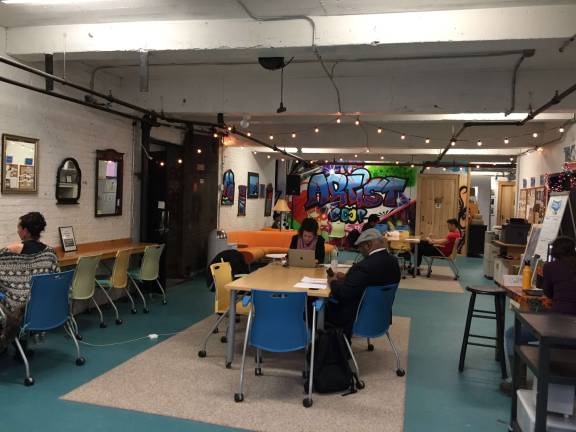Co-Working Gets Artsy


An unlikely newcomer to the explosion of co-working spaces caters specifically to the performing arts.
The Artist Co-op (TAC) is a place where actors, writers, producers, directors, choreographers and dancers can come to sweat on their projects, hang out and network.
A wide and welcoming entrance greets a visitor to the 2,000-square-foot space in Hell’s Kitchen. There’s an undulating sofa and a huge table surrounded by chairs. Comfortable seats line the sides of the room, members balancing laptops on their knees.
A young woman sits at a desk answering the phone and checking people in. You might expect a cacophony of chaos, but instead there’s an air of quiet concentration and professionalism.
An A-frame highlights what’s on tap at TAC for that day — what’s scheduled in the rehearsal rooms, at the conference table, or at a co-working happening. A member would check in, setup a work station, maybe write new pages for a project. Websites could be updated, scripts memorized. Meetings with collaborators might follow, or rehearsals in one of the other two rooms.
There might be a play reading, done “cold,” by actors who receive their scripts just before performing. Author submissions are encouraged and readings are free and open to the public.
Or there might be a panel taking on tough issues that affect theater and film professionals. For example, did you know that there’s an organization called Intimacy Directors International? One recent panelist noted that just as there’s a position with the title “fight director,” there’s also the relatively new post of “intimacy choreographer,” someone who ensures that scenes involving nudity or simulated sex are monitored, just as there is for those where violence is involved.
Educating actors about their rights is part of what TAC is all about, according to frustrated actress turned founder and TAC executive director Rachel Berger. TAC’s mission, she said, is to build an intentional community that will embrace activism.
A high-energy 29-year-old with chocolate-colored, flowing hair and an irresistible smile, Berger said she spoke to anyone and everyone about her vision. “I just tell people what I want to do and ask, ‘You wanna help me?’ And now the Artist Co-op is a reality,” she laughed, her enthusiasm palpable.
The expansion of startups and freelancers has led to an abundance of co-working spaces in the city — from collectives like Fueled, Bond and LMHQ, to organizations like Regus and WeWork: places that supply everything from free Wi-Fi to fee-based conference rooms.
Corporations have stepped up. Barclays has opened a financial/technology-focused accelerator space called Rise; IBM has a learning environment called the IBM Cognitive Curriculum. There’s even a global network of live-work spaces called Roam.
Berger said TAC attracts a different community, and that key to its success are the two rehearsal spaces, which are kept spare to remain affordable. Members enjoy free Wi-Fi, mailboxes, lockers, printer and fax; educational programming and community events; and a library with scripts and props.
The organization, launched last May, now has 80 members, Berger said. Getting there took two years, advice from New York’s Small Business Development Center, apprenticeship at the Center For Social Innovation, and an Indiegogo crowdfunding campaign. There was also invaluable support from a Connecticut businessman, Ron Black.
“Several years ago, I started to have the time, interest and resources to help emerging performing artists,” Black said. But not for investments, as Black is “not looking for any monetary gain.” As he explained it: “Some guys buy expensive cars or second homes on the beach.” Black said he is “driven to help and support projects and people that need it.”
TAC positions itself on the side of inclusiveness, welcoming the polyglot inhabitants of the entertainment world, where diversity is a touchstone.
A recent TAC event, and its “first live community conversation,” focused on sexual harassment in the theater and was streamed live via Facebook. The panelists discussed how power relationships can easily morph into mistreatment; how demoralizing verbal and physical abuse can be; how race plays its part; and how explorations of men-women issues overlook the situations where men are the victims.
Money is always a concern for artists, and upcoming at TAC is a financial support group session. The aim is to educate student and professional artists on financial nut-and-bolts, how to advocate for legislative and institutional changes, and how to manage loan debt and budget on an erratic income.
But it’s not all serious. There’s also a weekly theatrical games workout at the clown gym class.